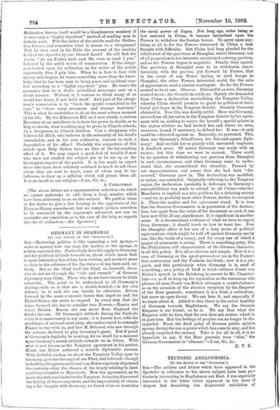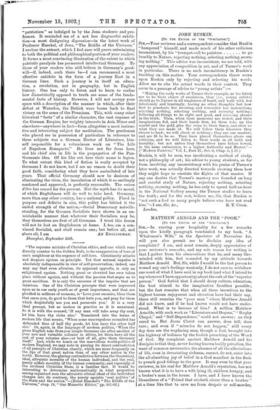TEUTONIC ANGLOPHOBIA.
[To THE EDITOR OF THE "SPECTATOR."]
Sin,—The articles and letters which have appeared in the Spectator in reference to the above subject have been par- ticularly interesting to Englishmen out East. I was especially interested in the letter which appeared in the issue of August 2nd describing the disgraceful exhibition of
"patriotism" as indulged in by the Jena students and pro- fessors. It reminded me of a not less disgraceful exhibi- tion—a most disfiguring digression—in the latest work of Professor Haeckel, of Jena, " The Riddle of the Universe." I enclose the extract, which I feel sure will prove entertaining to both the political and philosophical portion of your readers. It forms a most convincing illustration of the extent to which patriotic paralysis has permeated intellectual Germany. To those of your readers who still believe in Germany's good- will—if, indeed, such there be—I can recommend a most effective antidote in the form of a journey East in a German liner. Such a journey is in itself an educa- tion, a revelation, not in geography, but in English history. One has only to listen and to learn to realise how diametrically opposed to truth are some of the funda- mental facts of history. However, I will not occupy your space with a description of the manner in which, after their defeat at Waterloo, the British were borne back to final victory on the arms of the Prussians. This, with many other historical " facts " of a similar character, the vast expanse of the German Empire, her weighty interests in Asia Minor and elsewhere—anywhere in fact—form altogether a most instruc- tive and interesting subject for meditation. The gentleman who placed me in possession of particulars in reference to these subjects was a German Doctor of Literature, him- self responsible for a voluminous work on " The Life of Napoleon Bonaparte." He lives not far from here, and his chief aim in life is the propagation of the Pan- Germanic idea. Of his like out here their name is legion. To what extent this kind of fiction is really accepted by Germans I do not know, but I see no reason to doubt their good faith, considering what they have assimilated of late years. That official Germany should now be desirous of eliminating the virus, the inoculation of which it so smilingly condoned and approved, is perfectly reasonable. The raison d'être has ceased for the present. But the myth has its moral, of which Englishmen will do well to take heed. Germany, more than any other country, has a national policy. Fixed in purpose and definite in aim, this policy has behind it the united strength of the nation,—Social Democracy notwith- standing, for the German Socialists have shown in an un- mistakable manner that whatever their• Socialism may be, they themselves are first of all Germans. I trust this lesson will not be lost on Englishmen at home. I, too, am a con- vinced Socialist, and shall remain one; but before all, and "The supreme mistake of Christian ethics, and one which runs directly counter to the Golden Rule, is its exaggeration of love of one's neighbour at the expense of self-love. Christianity attacks and despises egoism on principle. Yet that natural impulse is absolutely indispensable in view of self-preservation; indeed, one may say that even altruism, its apparent opposite, is only an enlightened egoism. Nothing great or elevated has ever taken place without egoism, and without the passion that urges us to great sacrifices. It is only the excesses of the impulse that are injurious. One of the Christian precepts that were impressed upon us in our early youth as of great importance, and that are glorified in millions of sermons, is Love your enemies, bless them that curse you, do good to them that hate you, and pray for them which despitefully use you and persecute you.' It is a very ideal precept, but as useless in practice as it is unnatural. So it is with the counsel, 'If any man will take away thy coat, let him have thy cloke also.' Translated into the terms of modern life that means, 'When some unscrupulous scoundrel has defrauded thee of half thy goods, let him have the other half also.' Or, again, in the language of modern politics, ' When the pious English take from you simple Germans one after another of your new and valuable colonies in Africa, let them have all the rest of your colonies also—or best of all, give them Germany itself? And, while we touch on the marvellous world-politics of modern England, we may note in passing its direct contradiction of all precepts of Christian charity, which are more frequently on the lips of that great nation than of any other nation in the world. However, the glaring contradiction between the theoretical, ideal, altruistic morality of the human individual, and the real, purely selfish morality of the human community, and especially of the civilised Christian State, is a familiar fact. It would be interesting to determine mathematically in what proportion among organised men the altruistic ethical ideal of the individual Changes into its contrary, the purely egoistic 'real politics' of the State and the nation."—(Ernst Hawkers "The Riddle of the Universe," chap. 18, "Our Monastic Ethics," pp. 361-62.)























































 Previous page
Previous page